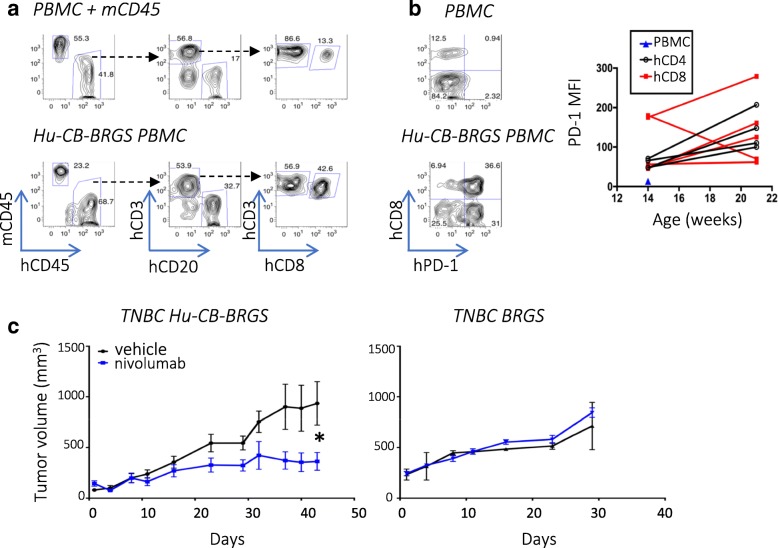Mice are often used to study cancer. Mouse tumor models are one of the commonly used animal models. Establishing an ideal animal model for tumors is of great significance for studying the pathogenesis, treatment, and prevention of tumors. The first animal model for cancer research was the rabbit model, and since then scientists have used multiple models including cell lines and genetically engineered mice to mimic human cancer. A humanized mouse model refers to a mouse model with a functional human gene, cell or tissue that is commonly used as a living replacement model for in vivo studies of human disease. At present, the humanized mouse model has become an important preclinical animal experimental model for studying human diseases. Creative Biolabs provides comprehensive screening models and the establishment of immunologic analysis in a humanized mouse model.
 Fig.1 Humanized mouse models. (Allen, 2019)
Fig.1 Humanized mouse models. (Allen, 2019)
The demand for humanized mice as a translational medical model, including biological research in regenerative medicine, transplantation, and immunology, is also increasing. Creative Biolabs owns rich modeling experience and experimental techniques. Please contact us as soon as possible and we will be happy to help you.
 Fig. 2 Anti-PD-1 therapy inhibits growth of TNBC xenograft in hu-CB-BRGS model. (A. Capasso, 2019)
Fig. 2 Anti-PD-1 therapy inhibits growth of TNBC xenograft in hu-CB-BRGS model. (A. Capasso, 2019)
The article examines the effectiveness of anti-PD-1 mono and combination immunotherapy using a hematopoietic humanized mouse model implanted with tumor xenografts. The research is significant as it advances our understanding of immune checkpoint blockade in treating cancers like triple-negative breast cancer (TNBC) and microsatellite instability-high (MSI-H) colorectal cancer (CRC). Key results include enhanced anti-tumor human T-cell responses and reduced regulatory T-cell and myeloid cell populations in humanized mice treated with anti-PD-1, correlating with tumor growth inhibition. Humanized mouse models based on immunogenicity assessment played a crucial role by mimicking human immune responses more accurately than traditional models, providing a vital platform for testing and improving immunotherapeutic strategies against various cancers.
A humanized mouse model refers to genetically modified mice that have been engrafted with human tissues, cells, or genes, allowing them to mimic human immune system characteristics. This makes them invaluable for studying human diseases and testing treatments, including immunogenicity of biopharmaceuticals.
Humanized mice are used to evaluate how therapeutic proteins and vaccines might elicit immune responses in humans. By incorporating human immune cells or genes, these models provide a closer simulation of human reactions to these substances, which is critical for safety and efficacy testing before clinical trials.
The most common type of human cells introduced into humanized mice are hematopoietic stem cells (HSCs), which can develop into various types of immune cells. This engraftment allows the mice to produce human-like immune responses to experimental treatments.
These models are essential for assessing the immunogenic potential of drugs that can't be accurately evaluated in traditional animal models due to differences between human and animal immune systems. They help predict adverse human immune reactions and optimize therapeutic designs to reduce immunogenicity.
While humanized mice provide a more accurate model than traditional animal models, they may not fully replicate all aspects of the human immune system. Limitations include incomplete immune response due to the lack of some immune cell types or interactions.
Traditional mouse models often fail to predict human-specific immune reactions because of significant differences in immune system components and responses. Humanized mice, with their human immune cells, provide a more accurate representation, leading to better predictions of how humans might respond to new therapies.
While particularly useful for biologics, which can elicit strong immune responses, humanized mice are also beneficial for testing small molecule drugs that modulate the immune system. However, their use may be limited by how well the drug targets and pathways are conserved between humans and mice.
Recent advancements include the development of models with more complete human immune systems, including T cells, B cells, and myeloid cells. Improvements in genetic engineering techniques also allow for more specific human gene expressions, enhancing the model's predictive accuracy for human responses.
Use the resources in our library to help you understand your options and make critical decisions for your study.
All listed services and products are For Research Use Only. Do Not use in any diagnostic or therapeutic applications.
| USA:
Europe: Germany: |
|
|
Call us at: USA: UK: Germany: |
|
|
Fax:
|
|
| Email: info@creative-biolabs.com |
